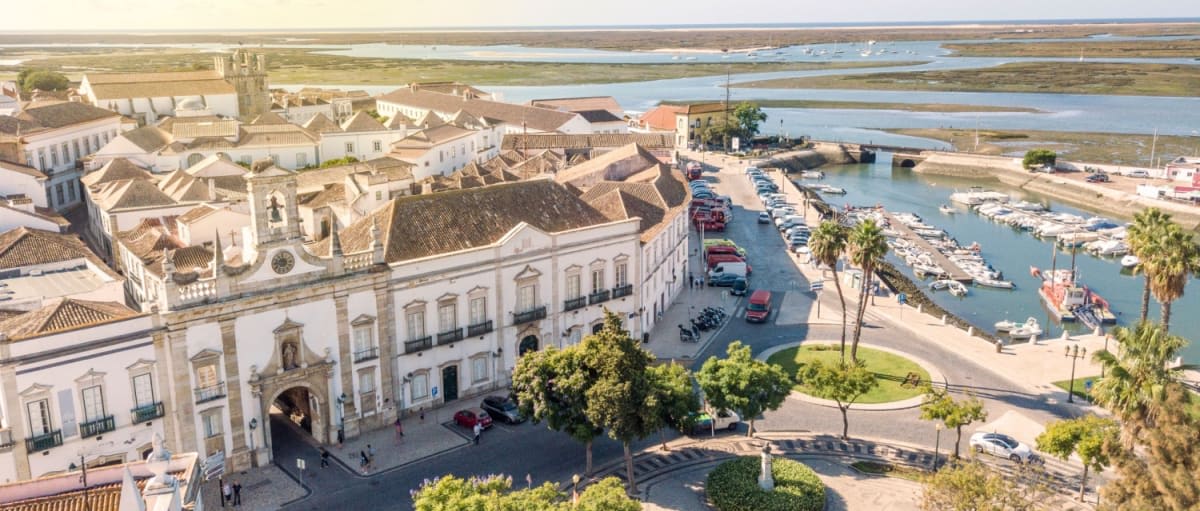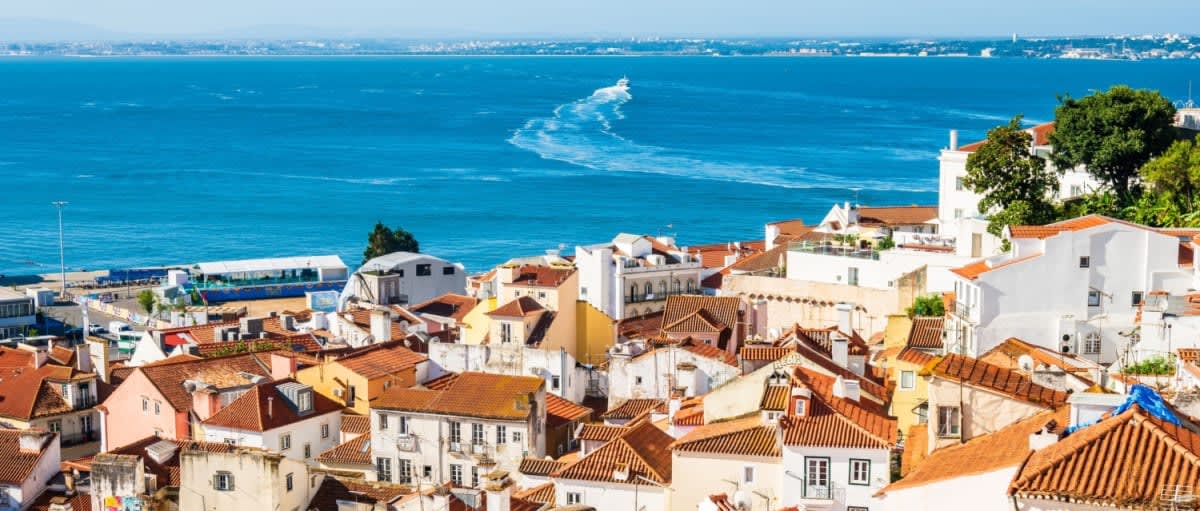Portugal is one of Europe’s most attractive destinations for overseas buyers. With its dramatic Atlantic coastline, mild winters and welcoming lifestyle, it’s not hard to understand the appeal. But while buying a home here can be rewarding, it’s not without its challenges.
As with any expensive purchase, there are risks, mistakes and unscrupulous operators to avoid.
The good news is that any potential pitfalls of buying property in Portugal can be avoided with preparation and the right professional team in place. Let’s analyse the main risks:
Contents

Choosing the right location
Portugal may appear compact on a map, but its regions are strikingly diverse – from lively beach resorts to sleepy inland villages. Jumping into a purchase without understanding what daily life in your chosen area really involves is one of the most frequent buyer missteps.
Ask yourself probing questions. Will the climate suit you year-round, or is it only suitable in winter? Do you want a place buzzing with tourists or somewhere more peaceful and residential? If you’re hoping to integrate locally, will there be opportunities to interact with Portuguese neighbours, or is the area dominated by expats?
Short-term rental rules are another key point. Lisbon, Porto and parts of the Algarve have introduced strict licensing limits for local accommodation. If letting is on your radar, get clarity from a legal adviser or estate agent before you buy. A property without a tourist licence in a restricted zone is unlikely to be rentable under current rules.
Ultimately, the best advice is to spend time exploring different regions before committing. Local estate agents can help identify towns or suburbs that reflect your needs, but nothing replaces the insight gained from physically experiencing the area in different seasons.
Rising competition and housing shortages
The Portuguese property market has seen strong demand from both local buyers and foreigners, which has contributed to rising prices and a shortage of affordable homes in popular areas such as Lisbon, Porto and parts of the Algarve.
This can mean stiffer competition on offers and potentially paying over market value if you rush decisions without proper research and timing.
Such was the problem that the Portuguese government passed its Mais Habitação (More Housing) law in 2023 to help get housing under control.
Understanding the full buying costs
Property prices in Portugal may seem good value compared to other parts of Europe, but many buyers overlook the added expenses that come with purchasing real estate here. These costs can easily add 8–10% to the agreed purchase price, depending on the specifics of the transaction.
The headline costs include:
- IMT (transfer tax): This varies on a sliding scale up to 6.5% for resale properties.
- Stamp duty: Usually fixed at 0.8% of the property value.
- Notary and registry fees: Between 1.5% and 2% combined – essential for formally recording your ownership.
- Legal fees: A good property solicitor will typically charge 1–3% of the purchase price.
If you’re buying a new-build property, VAT (IVA) may also apply. This stands at 23% and is generally included in the advertised sales price, but it’s important to double-check.
Additional costs can include home insurance, survey fees, mortgage arrangement charges, connection fees for water and electricity, and management fees for those buying in condominiums. Speak to your lawyer ahead of time to prepare a full cost breakdown. It’s better to plan now than scramble for funds later.
Managing currency risk
Buyers from outside the eurozone often ignore – or underestimate – currency risk when budgeting for their Portuguese home. Yet exchange rates can fluctuate dramatically over just a few weeks. If your deposit, balance or fees are sent when your currency weakens, it could cost you thousands unexpectedly.
Let’s say you agree to buy a property for €300,000. If you’re paying in pounds sterling and the rate shifts just 2% against you, that’s roughly £5,000 lost due to timing alone.
To manage this risk, financial experts strongly advise using a specialist currency provider – especially one familiar with property purchases. Unlike high-street banks, they can offer margin-beating exchange rates and forward contracts, which allow you to lock in a rate even before your funds are ready.
Forward contracts are especially helpful during the two to three-month period between signing the Contrato de Promessa de Compra e Venda (promissory contract) and completing at the notary’s office. Ask your currency specialist to provide visibility over your final euro cost in advance – it will help you stay on budget and avoid last-minute panics.
Our partner, Smart Currency Exchange, is one of the few providers tailored to overseas property buyers and offers personal one-on-one support throughout your purchase.
Avoiding legal traps
Portugal has strong legal protections for property buyers – but only if you take the right steps. The biggest mistake many make is relying solely on the seller’s solicitor or agent without appointing their own legal representation.
You should always use an independent lawyer who is registered with the Portuguese Bar Association and specialises in real estate transactions. Ideally, look for one who speaks fluent English and has experience with international clients.
Your lawyer will carry out vital checks before you sign anything. These include ensuring the seller has legal title, inspecting planning permissions, confirming the property’s boundaries and checking for debts or charges attached to the home. Inheritance disputes and co-ownership misunderstandings are also common in rural areas and could delay or derail a sale.
Some properties — particularly rural homes or agricultural plots — can be subject to zoning restrictions or protected land designations. These rules may affect your ability to renovate, extend or even classify how the land can legally be used, and they differ depending on municipal plans. Carefully verify the land classification with your lawyer or local authority before signing.
If you’re planning to apply for a visa or residency (such as the D7 passive income visa or Golden Visa), it’s even more crucial to choose a lawyer who understands the connection between property law and immigration requirements.
The earlier a lawyer gets involved, the smoother and safer your purchase will be. A modest upfront investment could prevent far more expensive problems later on.
Why structural surveys matter
Property surveys are not a legal requirement in Portugal, and many domestic buyers choose to skip them. However, for international buyers unfamiliar with local construction norms, skipping a survey is a gamble that can backfire.
Older properties — often marketed as “character homes” — can mask costly renovation needs such as outdated plumbing, damp, insulation or structural issues. In addition to standard taxes, planning and renovation costs can push the real purchase price significantly above your initial budget. Allocating an extra contingency budget is essential.
To protect yourself, you can hire an independent chartered surveyor or engineer to carry out a full inspection. You’ll want someone who follows standards recognised by professional bodies such as the Royal Institution of Chartered Surveyors (RICS) or their Portuguese counterparts. A good lawyer can help source a reputable expert near your property.
If a problem is uncovered, your lawyer can negotiate a price reduction or amend the contract terms accordingly. It is also possible to include a clause in the promissory contract that gives you an opt-out if major structural faults are found. We’ve written more extensively about how to get a property survey in Portugal if you would like to know more.
Given the modest cost of a survey relative to the property itself, many overseas homeowners think of it as a small price to pay for peace of mind.
Risks of buying off-plan
New developments and off-plan properties can be excellent value, especially in up-and-coming areas. However, there are certain challenges that buyers must consider early on to prevent serious issues down the line.
Firstly, understand that when you buy off-plan in Portugal, your deposit is typically between 10% and 30% of the purchase price. You will commit to staged payments throughout the build, even though the completed property may be 18 months away.
As construction progresses, delays can occur due to factors outside your control – from supply chain disruptions to bureaucratic hurdles. Completion dates can overrun and you need to be prepared for those delays.
Furthermore, market conditions can evolve mid-build. If the developer reduces prices to attract more buyers during this period, your early purchase might lose some of its value – at least temporarily. On the other hand, a finished development can draw new interest, potentially making your property more attractive.
To minimise these risks, only buy from developers with a strong track record, and insist on seeing previous completed projects. Have your lawyer review the plans and get written guarantees over delivery timelines, specification and refund conditions. Make sure the contract includes a snagging clause, so all defects are rectified before full payment is released.
Buying off-plan in Portugal can be a sound option – but it demands careful due diligence and experienced support throughout the process.
Start your property search with confidence
Buying a home in Portugal as a foreign national is entirely possible and often straightforward – but only if you are properly informed and supported. At Your Overseas Home, we offer trusted guidance from legal experts, property consultants and financial specialists to help ensure your purchase runs smoothly from beginning to end.
Speak to a property consultant about your next step.
Being aware of common pitfalls is just the start. To make confident decisions, take a look at our detailed region-by-region guide to where to buy property in Portugal, and don’t miss our essential walkthrough of how to buy property in Portugal. These articles offer practical tips and expert insight to help you navigate every stage of the buying journey with clarity and care.
Frequently asked questions about property pitfalls in Portugal
Common pitfalls include underestimating total purchase costs, skipping legal checks, ignoring zoning or rental rules, and failing to plan for currency fluctuations. Working with the right professionals helps avoid these risks.
Yes — there are no restrictions on foreign ownership in Portugal and non-residents can buy property just like Portuguese citizens. However, you will need a Portuguese tax number (NIF), an independent lawyer, and might want to consider tax and residency implications before you buy.
Using a currency specialist allows you to lock in favourable exchange rates and avoid market swings. Forward contracts and regular payment plans are excellent tools to protect your budget during the buying process.
Plan for taxes, notary and registration fees, legal costs, surveyor fees, and any renovation or upgrades. Setting aside a contingency budget of at least 7–15% above the purchase price is a wise strategy to avoid surprise expenses.
Off-plan purchases can be delayed due to supply, planning or administrative reasons. A clear contract with detailed timelines, penalties for late delivery, and refund terms can help protect you — and you should always review these with your lawyer before signing.









